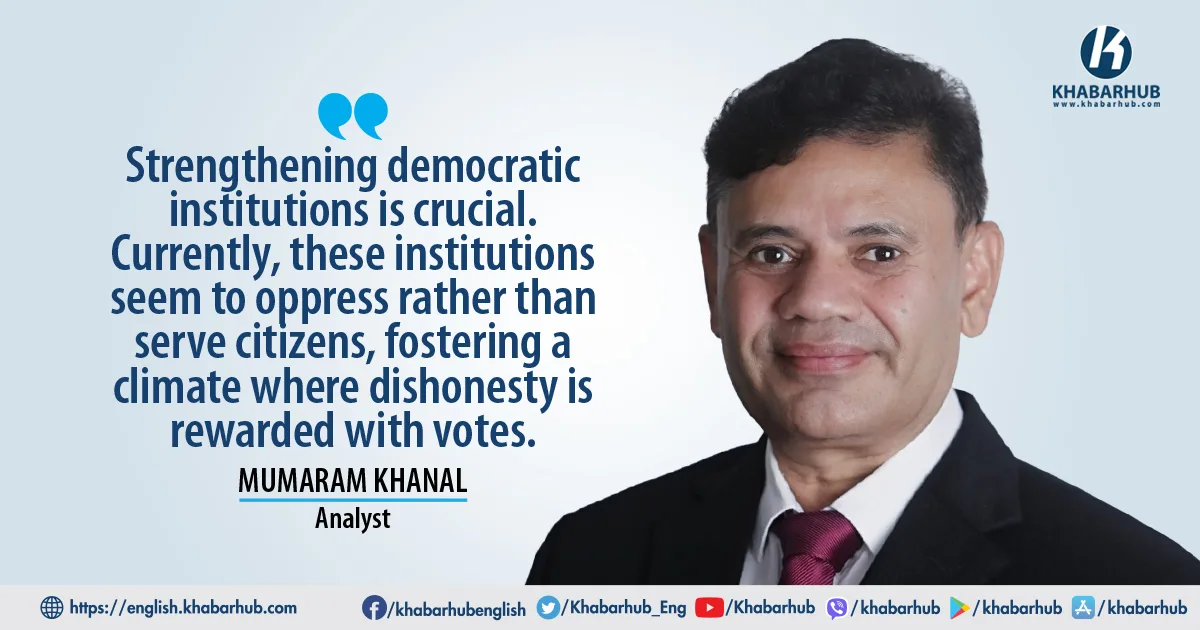KATHMANDU: Recently, there has been growing frustration among citizens questioning whether our system is flawed or if it’s a matter of the individuals in power.
Khabarhub held a conversation with political analyst Mumaram Khanal on Nepal’s current political scenario, among other issues. Excerpts:
Why has disappointment increased instead of trust being built even when grassroots leaders enter Singha Durbar?
There is profound disappointment among the common people, and it hasn’t arisen without reason.
This isn’t just a systemic failure of our government. Various systems exist globally, categorized broadly into four types: religious fundamentalist regimes, communist authoritarian regimes, autocratic monarchical regimes, and democratic regimes.
What is common among all these systems?
The common thread is that people care foremost about development.
Development should benefit the common people comprehensively, addressing their daily issues alongside broader progress initiatives.
For instance, constructing a viewpoint might symbolize development, but seeing people stranded on a suspension bridge in Karnali paints a different picture altogether—a juxtaposition of development and neglect.
How has the system evolved over time?
The top-tier politics may show signs of improvement, but the grassroots suffer due to a recurring issue: regardless of governance type, capable individuals must ascend to permanent positions of power.
Development remains pivotal across all systems, yet the governmental structure often takes precedence over actual developmental needs.
Why do citizens feel so let down currently?
Their future prospects haven’t significantly improved over time. When a political system falters, parties claim reform, but improvements are rarely tangible.
If we aim to nurture democracy, institutions must be strengthened. However, current realities indicate institutional failures burden citizens, making life challenging—from registering an industry to navigating administrative hurdles.
What about economic challenges?
Our domestic production base diminishes as imports replace local goods. There’s a reluctance to compete in our own markets, undermining economic self-sufficiency.
People naturally desire a prosperous future for their children, spanning generations. Sadly, the current leadership seems ineffective, clinging to power far beyond its relevance.
Is there a solution to this disillusionment?
Strengthening democratic institutions is crucial. Currently, these institutions seem to oppress rather than serve citizens, fostering a climate where dishonesty is rewarded with votes.
Corruption isn’t new, but recent years have seen a decline in adherence to laws and regulations, favoring unchecked exploitation.
What role have Maoists played in this scenario?
The Maoists, once proponents of armed struggle against parliamentary norms, now wield significant political influence.
Their legacy includes corruption scandals and a culture of impunity, eroding public trust in governance further.
How do you foresee the future?
The trajectory seems bleak unless there’s a concerted effort to restore integrity and accountability in leadership.
Citizens deserve a government that prioritizes their welfare over self-interest and political survival.
If so, have all avenues of hope been exhausted?
It’s not just about being chaotic. The reason for our disappointment lies in the fact that today’s youth are facing a severe lack of employment opportunities.
Even for 20, 30,000 job openings, there are hundreds of thousands of applicants.
The dreams of today’s youth have drastically shifted. They used to aspire to buy a car within a year and a house within two years.
Comparatively, in India, a middle-class individual can buy a new car for 2 lakh rupees with a salary of 2.3 lakhs.
After a down payment of 50,000, they get the car, and after paying off 2 lakhs, they can secure a flat.
But here, working for 50 to 60 years doesn’t guarantee owning a car or a house worth 3 million rupees.
So, the conditions to fulfill these dreams are not favorable here?
Exactly. When their friends go to Australia or America and see them achieving these dreams quickly, it becomes disheartening for our youth to dream big even after years of hardship here.
They wonder what their children will learn from their struggles. Unlike the times of our fathers and grandfathers, today’s youth no longer rely on just an acre or two of land; they have the capability to cultivate much more.
However, our political landscape is so ineffective that many of our energetic and capable youth seek opportunities abroad, selling their labor wherever they can.
How fair is it if citizens are displaced due to disparities in rights, resources, and opportunities within the country?
We’ve made little progress in restructuring state power. The bureaucracy, which needed a revamp, remains largely unchanged.
Consequently, a staggering 81 percent of the budget is spent on salaries and allowances, leaving little room for developmental initiatives.
Timely completion of our national projects could have led to widespread success and engagement, but unfortunately, many bureaucrats lack the competence needed to drive these initiatives forward.
Is the main issue then rooted in politics?
Absolutely. When politics fails, it negatively impacts everything else. Good politics would expedite progress in multiple sectors.
However, due to the current political climate, progress has been severely hindered across various domains.
How optimistic are you about the next generation that will succeed the current politically challenged one?
That optimism is dwindling. The previous generations had their flaws, but they also had a certain vigor and drive. Today’s generation seems disillusioned, seeing little change despite their efforts.
There’s a pervasive frustration with the state of politics and the lack of meaningful opportunities within it.
However, I remain hopeful that amidst political crises, there will emerge individuals with the capability to navigate and resolve these challenges.
My only concern is that this power shouldn’t gravitate towards extremes or backward ideologies.









Comment